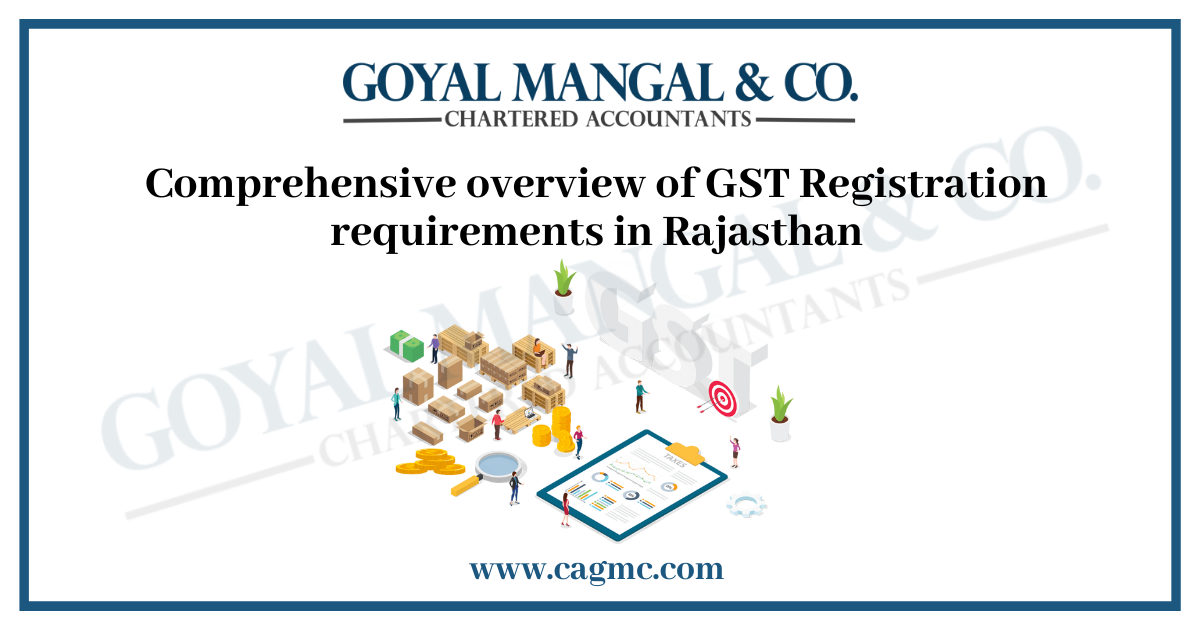
Welcome to the land of majestic forts, rich cultural heritage, and flourishing business opportunities – Rajasthan. From the enchanting pink city of Jaipur to the bustling markets of Jodhpur and the desert realms of Jaisalmer. Businesses in Rajasthan have witnessed a transformative shift with the advent of GST. In this comprehensive overview, we embark on GST registration in Rajasthan. Along with its eligibility criteria and requirements for GST registration. In detail information about the GST registration process in the Land of Kings, and its benefits.
| Table of Content |
Meaning of GST
GST is an abbreviation of Goods and Services Tax. GST is a value-added tax levied on the supply of goods and services in various countries around the world. The primitive aim of GST is to replace multiple indirect taxes. Likewise, excise duty, sales tax, and service tax with a single comprehensive tax. Therefore, simplifying the tax structure and reducing double taxation.
As per GST, businesses need to charge and collect GST on their sales. They can also claim credit for GST paid on their purchases. This helps in eliminating the double taxation impact of taxes and makes sure that tax is applied to the value added at each level of the supply chain.
Necessary requirements for GST registration in Rajasthan
The necessary requirements for GST registration in Rajasthan, India, include the following:
- Valid Mobile Number and Email Address: A valid mobile number and email address are required for OTP verification and communication purposes.
- Address Proof: You need to submit documents as proof of the principal place of business, such as a rental agreement, electricity bill, property tax receipt, or any other valid document.
- PAN (Permanent Account Number): Every applicant must have a PAN issued by the Income Tax Department.
- Proof of Constitution of Business: Depending on the type of business, you will need to provide relevant documents such as a Partnership Deed, Certificate of Incorporation, Memorandum of Association (MOA), Articles of Association (AOA), etc.
- Business Activities Information: Furnish details regarding the nature of the business, the type of goods or services supplied, and the related Harmonized System of Nomenclature (HSN) or Service Accounting Code (SAC) numbers.
- Bank Account Details: Provide bank account details, including a cancelled cheque or bank statement showing the name of the account holder, account number, branch address, and IFSC code.
- Authorized Signatory Details: If someone other than the proprietor or partners is authorized to sign and submit the application, their details and authorization letter should be provided.
- Photographs: Recent passport-sized photographs of the applicant or authorized signatory must be provided.
- Additional Documentation: Depending on the specific requirements of your business, you may be asked to provide additional documents such as NOC (No Objection Certificate) from the owner, proof of identity and address of partners/directors, etc.
Eligibility criteria for GST registration in Rajasthan
The eligibility criteria for GST registration in Rajasthan, India, are as follows:
Threshold Turnover Limit:
- For businesses engaged in the supply of goods, GST registration is mandatory if the aggregate turnover exceeds Rs. 40 lakhs in a financial year.
- For businesses engaged in the supply of services, GST registration is mandatory if the aggregate turnover exceeds Rs. 20 lakhs in a financial year.
- For businesses operating in special category states, including Rajasthan, the threshold limits are reduced to Rs. 20 lakhs for goods and Rs. 10 lakhs for services.
Mandatory Registration: Regardless of the turnover, certain businesses are required to register for GST, including:
- Interstate suppliers of taxable goods/services.
- Casual taxable persons.
- Non-resident taxable persons.
- Businesses are liable to deduct tax at source (TDS) or collect tax at source (TCS).
- E-commerce operators.
- Input service distributors.
- Online information database access and retrieval (OIDAR) service providers.
Voluntary Registration: Businesses that do not meet the above criteria can opt for voluntary GST registration to avail of various benefits, such as input tax credit, participating in inter-state trade, etc.
Mandatory documents for GST registration in Rajasthan
The mandatory documents required for GST registration in Rajasthan, India, include:
PAN (Permanent Account Number) Card: A copy of the PAN card of the applicant or authorized signatory is mandatory for GST registration.
- Identity Proof:
- For individual applicants, a copy of any government-issued identity proof such as an Aadhaar card, voter ID card, passport, driving license, etc., is required.
- For businesses other than individuals, identity proof documents of the authorized signatory, such as a PAN card, Aadhaar card, voter ID card, passport, or driving license, need to be provided.
- Address Proof:
- For individual applicants, a copy of any government-issued address proof such as an Aadhaar card, voter ID card, passport, driving license, utility bills, or rent agreement is required.
- For businesses other than individuals, address proof documents for the principal place of business, such as electricity bill, property tax receipt, rent agreement, etc., need to be provided.
- Photographs: Recent passport-sized photographs of the applicant or authorized signatory need to be submitted.
Proof of Constitution of Business: Depending on the type of business entity, the following documents may be required:
- For a Partnership firm: Partnership deed.
- For a Company: Certificate of Incorporation, Memorandum of Association (MOA), and Articles of Association (AOA).
- For a Limited Liability Partnership (LLP): Certificate of Incorporation and LLP agreement.
- For a society, trust, or non-profit organization: Registration certificate or any other relevant document.
Bank Account Details: A cancelled cheque or a copy of the bank statement/passbook showing the name of the account holder, account number, branch address, and IFSC code must be provided.
The step-by-step process for GST registration in Rajasthan
Here is a step-by-step process for GST registration in Rajasthan, India:
- Visit the GST Portal: Go to the official GST portal of the Government of India at www.gst.gov.in.
- Click on “Services”: On the GST portal’s homepage, click on the “Services” tab located in the main menu.
- Select “Registration”: From the drop-down menu under “Services,” select “Registration.”
- Click on “New Registration”: On the Registration page, click on “New Registration” to initiate the GST registration process.
- Fill in the details in the “New Registration” Form: Fill in the required details in the “New Registration” form, including your business’s legal name, PAN, email address, and mobile number. Choose the state as Rajasthan and the type of taxpayer (regular taxpayer, composition taxpayer, etc.).
- Submit the form: After filling in the details, click on “Proceed” to submit the form.
- Receive the Application Reference Number (ARN): Once the form is submitted successfully, you will receive an Application Reference Number (ARN) on your registered email and mobile number. Note down this ARN for future reference.
- Verify your application: The next step involves the verification of your application. This can be done in two ways:
- Normal mode: The verification documents are submitted physically to the concerned GST department office within 15 days.
- Aadhaar-based e-Sign: You can choose to verify your application electronically using an Aadhaar-based e-Sign.
- Wait for the Application Processing: After verification, the GST department will process your application. They may also seek additional information or documents if required.
- Approval and Issuance of GSTIN: Once your application is verified and processed successfully, the GST department will approve your registration. You will receive your Goods and Services Tax Identification Number (GSTIN) and the certificate of registration on your registered email and mobile number.
- Track Application Status: Throughout the process, you can track the status of your application using the ARN on the GST portal.
Benefits of GST registration in Rajasthan
GST registration in Rajasthan, India, offers several benefits to businesses. Here are some of the key advantages:
- Legally recognized business entity: GST registration establishes your business as a legally recognized entity. It lends credibility and authenticity to your operations.
- Seamless Interstate Trade: With GST registration, you can engage in inter-state trade without any restrictions or barriers. It eliminates the complexities of multiple state taxes and ensures a smooth flow of goods and services across state boundaries.
- Input Tax Credit (ITC): Registered businesses can claim Input Tax Credit, which allows them to set off the GST paid on purchases against the GST liability on sales. This helps in reducing the overall tax burden and enhances profitability.
- Compliance with the Law: GST registration ensures compliance with the GST law, avoiding penalties or legal consequences for non-compliance.
- Expansion Opportunities: GST registration enables businesses to expand their reach beyond state boundaries and explore new markets across the country. It facilitates growth and provides opportunities for business expansion.
- E-commerce Benefits: If you are an e-commerce operator or plan to sell goods or services online, GST registration is mandatory. It allows you to avail yourself of the benefits and compliance requirements specific to the e-commerce sector.
- Government Tenders: GST registration is often a prerequisite for participating in government tenders or contracts. It opens up opportunities to engage with government entities and secure business contracts.
Takeaway
Evaluating the comprehensive overview of GST registration requirements in Rajasthan has shown some light on the path businesses must step to unlock their full potential in this vibrant state. From understanding the eligibility criteria and mandatory documents to navigating the step-by-step process. We have provided you with the knowledge and insights to embark on this transformative journey.


